Related Research Articles

Liberia, officially the Republic of Liberia, is a country on the West African coast. It is bordered by Sierra Leone to its northwest, Guinea to its north, Ivory Coast to its east, and the Atlantic Ocean to its south and southwest. It has a population of around 5 million and covers an area of 43,000 square miles (111,369 km2). English is the official language, but over 20 indigenous languages are spoken, reflecting the country's ethnic and cultural diversity. The country's capital and largest city is Monrovia.

Liberia is a country in West Africa founded by free people of color from the United States. The emigration of African Americans, both free and recently emancipated, was funded and organized by the American Colonization Society (ACS). The mortality rate of these settlers was the highest among settlements reported with modern recordkeeping. Of the 4,571 emigrants who arrived in Liberia between 1820 and 1843, only 1,819 survived (39.8%).
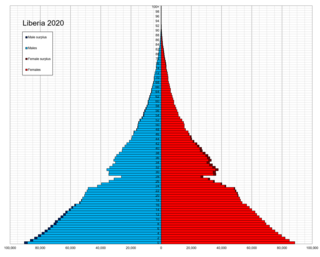
As of 2006, Liberia has the highest population growth rate in the world. 43.5% of Liberians were below the age of 15 in 2010. With recent civil wars being fought along ethnic lines, Liberia is a multiethnic and multicultural country.
The Krahn are an ethnic group of Liberia and Ivory Coast. This group belongs to the Kru language family and its people are sometimes referred to as the Wee, Guéré, Sapo, or Wobe. It is likely that Western contact with the Kru language is the primary reason for the development of these different names.
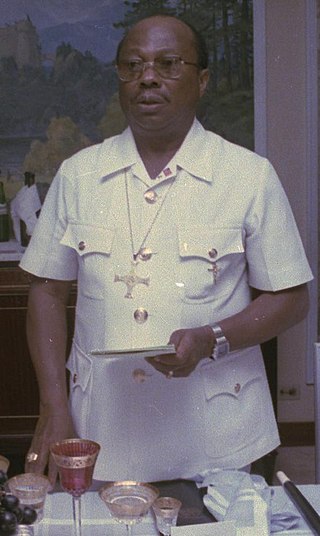
William Richard Tolbert Jr. was a Liberian politician who served as the 20th president of Liberia from 1971 until 1980.

The culture of Liberia reflects this nation's diverse ethnicities and long history. Liberia is located in West Africa on the Atlantic Coast.

Joseph Jenkins Roberts was an African-American merchant who emigrated to Liberia in 1829, where he became a politician. Elected as the first (1848–1856) and seventh (1872–1876) president of Liberia after independence, he was the first man of African descent to govern the country, serving previously as governor from 1841 to 1848. Born free in Norfolk, Virginia, Roberts emigrated as a young man with his mother, siblings, wife, and child to the young West African colony. He opened a trading firm in Monrovia and later engaged in politics.
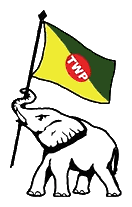
The True Whig Party (TWP), also known as the Liberian Whig Party (LWP), is the oldest political party in Liberia and one of the oldest parties in Africa. Founded in 1869 by primarily darker-skinned Americo-Liberians in rural areas, its historic rival was the Republican Party. Following the decline of the latter, it dominated Liberian politics from 1878 until 1980. The nation was virtually governed as a one-party state under the TWP, although opposition parties were never outlawed.
Westernization, also Europeanisation or occidentalization, is a process whereby societies come under or adopt Western culture in areas such as industry, technology, science, education, politics, economics, lifestyle, law, norms, mores, customs, traditions, values, mentality, perceptions, diet, clothing, language, writing system, religion, and philosophy. During colonialism it often involved the spread of Christianity.
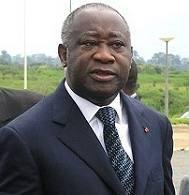
The Kru, Kroo, Krou or Kuru are a West African ethnic group who are indigenous to western Ivory Coast and eastern Liberia. They migrated and settled along various points of the West African coast, notably Freetown, Sierra Leone, but also the Ivorian and Nigerian coasts. The Kru people are a large ethnic group that is made up of several sub-ethnic groups in Liberia and Ivory Coast. These tribes include Bété, Bassa, Krumen, Guéré, Grebo, Klao, Dida, Krahn people and, Jabo people. The kru people were more valuable as traders and sailors on slave ships than as slave labor. To ensure their status as “freemen,” they initiated the practice of tattooing their foreheads and the bridge of their nose with indigo dye to distinguish them from slave labor.

The Bassa people are a West African ethnic group primarily native to Liberia. The Bassa people are a subgroup of the larger Kru people of Liberia and Ivory Coast. They form a majority or a significant minority in Liberia's Grand Bassa, Rivercess, Margibi and Montserrado counties. In Liberia's capital of Monrovia, they are the largest ethnic group. With an overall population of about 1.05 million, they are the second largest ethnic group in Liberia (18%), after the Kpelle people (26%). Small Bassa communities are also found in Sierra Leone and Ivory Coast.

Liberian nationality law is regulated by the Constitution of Liberia, as amended; the Aliens and Nationality Law, and its revisions; and various international agreements to which the country is a signatory. These laws determine who is, or is eligible to be, a national of Liberia. The legal means to acquire nationality, formal legal membership in a nation, differ from the domestic relationship of rights and obligations between a national and the nation, known as citizenship. Nationality describes the relationship of an individual to the state under international law, whereas citizenship is the domestic relationship of an individual within the nation. Liberian nationality is based on descent from a person who is Negro, regardless of whether they were born on Liberian soil, jus soli, or abroad to Liberian parents, jus sanguinis. The Negro clause was inserted from the founding of the colony as a refuge for former slaves to prevent economically powerful communities from obtaining political power. It can be granted to persons with an affiliation to the country, or to a permanent resident who has lived in the country for a given period of time through naturalization.

The Grebo or Glebo people are an ethnic group or subgroup within the larger Kru group of Africa, a language and cultural ethnicity, and to certain of its constituent elements. Within Liberia members of this group are found primarily in Maryland County and Grand Kru County in the southeastern portion of the country, but also in River Gee County and Sinoe County. The Grebo population in Côte d'Ivoire are known as the Krumen and are found in the southwestern corner of that country.
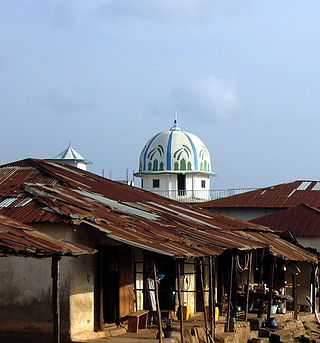
Islam in Liberia is practiced by an estimated 12.2% of the population. The vast majority of Liberian Muslims are Malikite Sunni, with sizeable Shia and Ahmadiyya minorities. The primary Muslim ethnic groups are the Vai and Mandingo but also Gbandi, Kpelle and other ethnic groups. Historically, Liberian Muslims have followed a relaxed and liberal form of Islam that is heavily influenced by indigenous religions that were integrated into Islam when it came to Liberia in the 16th century with the collapse of the Songhai Empire in Mali. Islamic religious practices vary in cities and towns across the country. Younger Liberian Muslims, particularly in the cities along the coast, tend to be more secular but still practice Islam in everyday life. In rural areas, Liberian Muslims are more conservative in dressing modestly, performing prayers and attending religious studies. The practice of Islam in Liberia has been compared to Islam common in Senegal and Gambia, with strong orientation toward Sufism. The major Islamic holidays, Eid el Fitr, Ramadan and Eid al Adha, called Tabaski Day, are celebrated annually in Liberia. People have begun to go on Hajj to Mecca in recent years. Joint English-Arabic language, Quranic, and Muslim universities and Islamic studies schools have opened and been rebuilt in the capital Monrovia, rural towns and other cities. Islam appears to be experiencing revival alongside Christianity in the country as a result of the Liberian Civil War. America-Liberian Methodists, the first Christians in Liberia, arrived on January 7, 1822.

Liberian Americans are an ethnic group of Americans of full or partial Liberian ancestry. This can include Liberians who are descendants of Americo-Liberian people in America. The first wave of Liberians to the United States, after the slavery period, was after of the First Liberian Civil War in the 1990s and, then, after the Second Liberian Civil War in the early 2000s.
Christianity is the predominant religion in Liberia, with Protestantism being its largest denomination. Muslims are the largest minority group, largely coming from the Mandingo and Vai ethnic groups. The vast majority of Muslims are Malikite Sunni, with sizeable Shia and Ahmadiyya minorities.

An independence referendum was held in Liberia on 27 October 1846. The result was 52% in favour, with independence being declared on 26 July 1847.

The Sierra Leone Creole people are an ethnic group of Sierra Leone. The Sierra Leone Creole people are descendants of freed African-American, Afro-Caribbean, and Liberated African slaves who settled in the Western Area of Sierra Leone between 1787 and about 1885. The colony was established by the British, supported by abolitionists, under the Sierra Leone Company as a place for freedmen. The settlers called their new settlement Freetown. Today, the Sierra Leone Creoles are 1.2 percent of the population of Sierra Leone.
Americo-Liberian people or Congo people or Congau people in Liberian English, are a Liberian ethnic group of African American, Afro-Caribbean, and liberated African descent. The sister ethnic group of Americo-Liberians are the Sierra Leone Creole people, who share similar ancestry and related culture. Americo-Liberians trace their ancestry to free-born and formerly enslaved African Americans who emigrated in the 19th century to become the founders of the state of Liberia. They identified there as Americo-Liberians. Some African Americans following resettlement in Canada also participated as founding settlers in Sierra Leone and other Recaptive repatriates settled in present-day Côte d'Ivoire.
Suah Koko was an indigenous Liberian ruler who lived between the late 19th and early 20th century. She fought several battles against the expansionary Liberia Frontier Force before entering negotiations to grant accession of the territory she ruled over to the Liberian government. She later became a paramount chief and supplied porters to the Harvard Medical African Expedition (1926–1927).
References
- ↑ "Culture of Liberia", EveryCulture.com
- ↑ Lawrence Bart Breitborde, Speaking and Social Identity: English in the Lives of Urban Africans, pg. 193-194
- ↑ Ayodeji Olukoju, Culture and Customs of Liberia, 2006, pg. 112
- ↑ Howard Temperley, After Slavery: Emancipation and its Discontents, pg. 81
- ↑ Liberia Country Study, "Americo Liberians and the Indigenes", GlobalSecurity.org
- ↑ Stephen Ellis, The Mask Of Anarchy: The Destruction of Liberia and the Religious Dimension of an African Civil War, 2001, pg. 305
- ↑ "Culture of Liberia", EveryCulture.com
- ↑ Lawrence Bart Breitborde, Speaking and Social Identity: English in the Lives of Urban Africans, pg. 193
- ↑ Liberia Country Study, "Americo Liberians and the Indigenes", GlobalSecurity.org
- ↑ Liberia Country Study, "The Christianity of Indigenous Africans", GlobalSecurity.org
- ↑ Liberia Country Study, "The Christianity of Indigenous Africans", GlobalSecurity.org